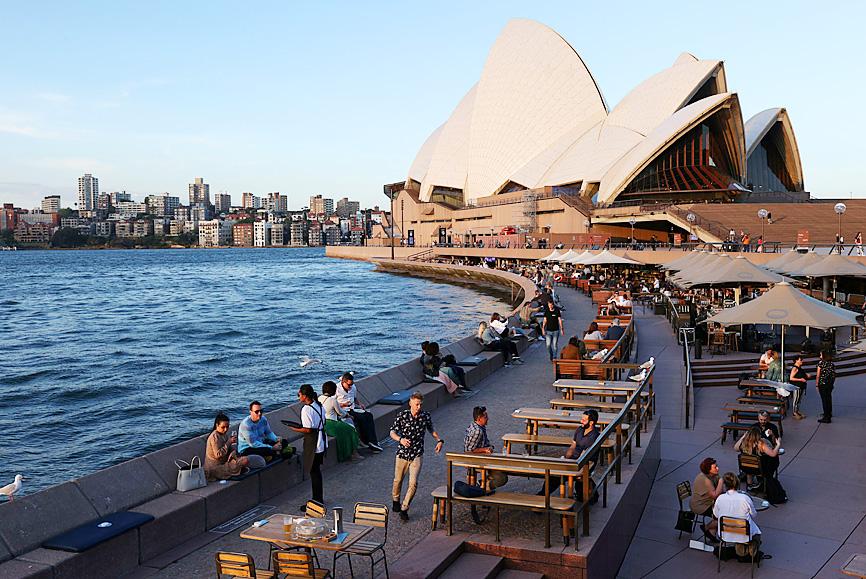China’s investment in Australia last year plunged to a record low of A$1 billion (US$775 million), according to data compiled by the Australian National University (ANU), as relations between the two countries soured amid the COVID-19 pandemic.
Investment by Chinese companies in Australia fell 61 percent, following a 47 percent fall in the prior year.
This was the lowest level of activity in the six-year history of the data that are part of the ANU’s Chinese Investment in Australia Database.

Photo: Reuters
The number of projects recorded was only 20, well down from a peak of 111 in 2016, when investment amounted to A$16.5 billion.
Relations between the two nations deteriorated last year after Australian Prime Minister Scott Morrison led calls for an independent probe into the origins of COVID-19 and saw China hit products from barley to wine to lobsters with tariffs, anti-dumping probes or delays at port.
Separately, Australia tightened investment-screening arrangements with foreign powers.
The dip “reflects the effects of COVID, but also more scrutiny of foreign investment by the Australian government, particularly that from China,” Shiro Armstrong, director of the East Asian Bureau of Economic Research at the ANU, wrote in a release yesterday.
Laws passed in December last year give Australia’s foreign minister the power to stop signed agreements between overseas governments and Australia’s eight states and territories, and with local authorities and universities.
Armstrong said that 86 percent of the investment last year was from Chinese companies already established in Australia, and was limited to the real-estate, mining and manufacturing sectors.
“In 2020, the year of COVID-19, foreign direct investment fell globally by 42% according to the United Nations,” Armstrong wrote.

China has claimed a breakthrough in developing homegrown chipmaking equipment, an important step in overcoming US sanctions designed to thwart Beijing’s semiconductor goals. State-linked organizations are advised to use a new laser-based immersion lithography machine with a resolution of 65 nanometers or better, the Chinese Ministry of Industry and Information Technology (MIIT) said in an announcement this month. Although the note does not specify the supplier, the spec marks a significant step up from the previous most advanced indigenous equipment — developed by Shanghai Micro Electronics Equipment Group Co (SMEE, 上海微電子) — which stood at about 90 nanometers. MIIT’s claimed advances last

ISSUES: Gogoro has been struggling with ballooning losses and was recently embroiled in alleged subsidy fraud, using Chinese-made components instead of locally made parts Gogoro Inc (睿能創意), the nation’s biggest electric scooter maker, yesterday said that its chairman and CEO Horace Luke (陸學森) has resigned amid chronic losses and probes into the company’s alleged involvement in subsidy fraud. The board of directors nominated Reuntex Group (潤泰集團) general counsel Tamon Tseng (曾夢達) as the company’s new chairman, Gogoro said in a statement. Ruentex is Gogoro’s biggest stakeholder. Gogoro Taiwan general manager Henry Chiang (姜家煒) is to serve as acting CEO during the interim period, the statement said. Luke’s departure came as a bombshell yesterday. As a company founder, he has played a key role in pushing for the

EUROPE ON HOLD: Among a flurry of announcements, Intel said it would postpone new factories in Germany and Poland, but remains committed to its US expansion Intel Corp chief executive officer Pat Gelsinger has landed Amazon.com Inc’s Amazon Web Services (AWS) as a customer for the company’s manufacturing business, potentially bringing work to new plants under construction in the US and boosting his efforts to turn around the embattled chipmaker. Intel and AWS are to coinvest in a custom semiconductor for artificial intelligence computing — what is known as a fabric chip — in a “multiyear, multibillion-dollar framework,” Intel said in a statement on Monday. The work would rely on Intel’s 18A process, an advanced chipmaking technology. Intel shares rose more than 8 percent in late trading after the

GLOBAL ECONOMY: Policymakers have a choice of a small 25 basis-point cut or a bold cut of 50 basis points, which would help the labor market, but might reignite inflation The US Federal Reserve is gearing up to announce its first interest rate cut in more than four years on Wednesday, with policymakers expected to debate how big a move to make less than two months before the US presidential election. Senior officials at the US central bank including Fed Chairman Jerome Powell have in recent weeks indicated that a rate cut is coming this month, as inflation eases toward the bank’s long-term target of two percent, and the labor market continues to cool. The Fed, which has a dual mandate from the US Congress to act independently to ensure